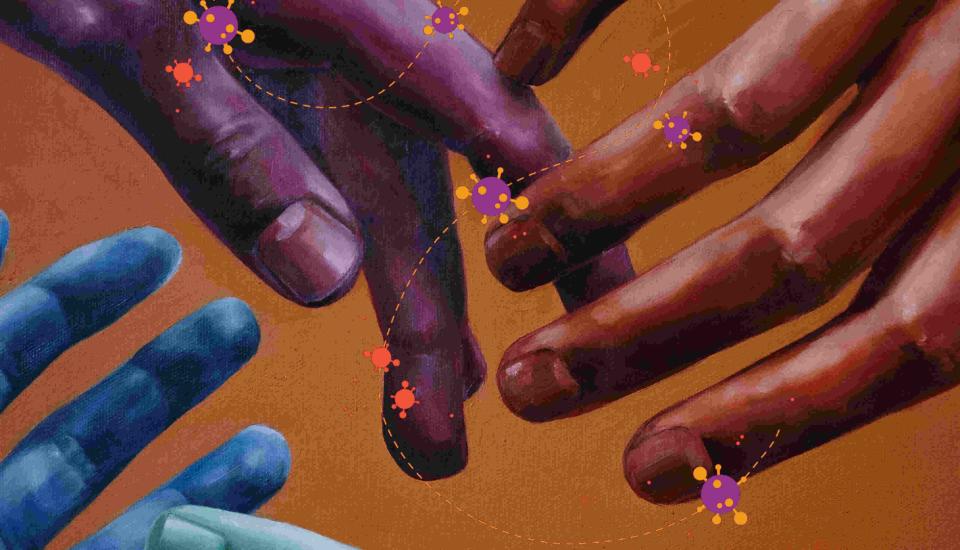
As businesses and industries began to close down just a short two months ago in the U.S.A., disenfranchised groups found themselves in a scramble. For essential workers and working-class service workers, the option to work from home is not an option, and the fear of contracting COVID-19 doesn’t outweigh fears of not making rent and the bills on time. Those same marginalized people still on the frontlines—as grocery store workers, fast food attendees and healthcare workers alike—are susceptible to being closely watched and surveilled within the workplace, while their cis, straight, and/or white counterparts are deemed to be more trustworthy and willing to work hard. I’ve seen marginalized people get fired or reprimanded for less, or equal wrongs as their cis, white, male counterparts.
These workplace politics were already difficult enough before COVID-19 hit, but now these vulnerable communities are applying for unemployment at higher rates, putting them even more at risk than before. Not only do women and members of the LGBTQIA+ community find themselves as the majority of those working in what the HRC calls “highly affected industries,” but these groups also are applying for unemployment at historic rates with women applications ranging from 50-60% in various states, and although the statistics for LGBTQIA+ people are not able to be fully accounted for, they still make up about 40% of the affected industries.
These workplace politics were already difficult enough before COVID-19 hit, but now these vulnerable communities are applying for unemployment at higher rates, putting them even more at-risk than before.
As unemployment increases, employers are panicking and leaving their workers out to dry, and it shows. The Intercept reported that in Ohio a form was released on the Ohio Department of Job and Family Services website “for employers to confidentially report employees ‘who quit or refuse work when it is available due to COVID-19.’” Within the week of the 13th of May, it was reported that a pair of hackers had created a script that flooded this site, now putting the state of Ohio in the position of having to take down the site and reconsider the treatment of working-class people. But who would be more likely to be reported? In surveys conducted by Catalyst, it was reported that “one-fifth (20%) of LGBTQ Americans have experienced discrimination based on sexual orientation or gender identity when applying for jobs” and this number could be even higher, considering that about 46% of workers remain closeted in their workplaces. This easily can be translated into online surveillance of employees.
Since COVID-19 hit, this surveillance has been exacerbated, and marginalized people are put into positions that challenge both their employment and safety.
A queer Trader Joe’s employee from upstate New York who wishes to remain anonymous, says that tensions in the workplace have been high since the death of Joe Coulombe, Trader Joe’s founder, in late February, and the subsequent fight for PPE and worker protection once the pandemic reached a height in the U.S. According to this employee, customers were previously required to wear masks upon entry, and were being “limited to around 30 people in the store”, but due to recent upsets about requiring customers to wear masks, the employee says, “now they’re allowing people in the store without masks, it seems like there is a lawsuit and instead of going to court or anything they’re just caving because they want to avoid a scandal. “This employee says that while Trader Joe’s doesn’t utilize cameras to watch employees, the surveillance is still present even with fellow co-workers and management. But the fact that the availability of the PPE was only put into place because of recent talks of unionization, this employee says it doesn’t feel like Trader Joe’s has their “best interests at heart.” In fact, while sharing this same sentiment with a fellow employee, their co-worker responded saying, “I would be careful saying things like that. They’re cutting hours, whose hours would you cut—someone who would be happy to be there, or someone who is clearly trying to start shit? [sic].” This same employee fears this surveillance action by their co-worker, stating at the end of the day “it was a co-worker regulating my actions for fear of punitive administrative response.”
"They’re cutting hours, whose hours would you cut—someone who would be happy to be there, or someone who is clearly trying to start shit? [sic].”
At this same store, the employee states that a fellow co-worker, who is Black and Queer, were recently fired for sharing their employee discount with a non-employee. It was a first-time offence, and the employee had been with the store for months. It becomes clear here that these demographics are not safe in the workplace and are under higher scrutiny in comparison to others. This pandemic has only transformed this discrimination that these marginalized groups already face into managerial actions and decisions taken under the guise of saving money for the company. It is easier now to cut out workers about whom there are already several assumptions being made about their “team efforts”.
Taking this into the context of the attempts of the state of Ohio to report vulnerable workers on unemployment, what’s to say that any other state would not do the same? Not only do working-class women and LGBTQIA+ people use the Internet to share their qualms and thoughts, but also to learn news about unionization and workplace conditions, but now with the pandemic, Internet usage has increased since stay-at-home orders have been put in place. And now, the Senate has voted against a Patriot Act amendment, which would have protected use rights and forbade the American government from collecting Internet browser history without a warrant.
In this same article, Vox writes that while the Patriot Act started with the intention to respond to “intelligence failures” leading up to 9/11, it was later uncovered by Edward Snowden that “the law was being used to secretly surveil Americans.” During this pandemic, marginalized people who are traditionally discriminated in the workplace anyways are obviously more suspicious. In addition to this, these same groups find themselves at the mercy of online discrimination and surveillance as well. A global survey by the Association for Progressive Communications showed that “66% [of respondents] reported the internet is an “important” or “very important” medium of sexual expression, while...(75%) also reported being harassed online.” This remains true, and while grocery store workers are using Reddit to communicate their workplace struggles, and workers are unionizing online, they are being put into a position of losing their jobs, and safety online.
Queer people and women are being put into a tricky situation, and this is only exacerbated if they are people of colour. So, do they advocate for themselves and use the tools online to connect to workers across America also struggling during this time, do they use unreliable unemployment application portals in the hope of receiving some help? Or will the system discriminate against them once again?
Queer people and women are being put into a tricky situation, and this is only exacerbated if they are people of colour.
I got into contact with Gaby, a current remote worker for Florida’s unemployment assistance program. She calls this current unemployment crisis “dystopic,” and “heavily monitored,” recalling how often as she works, she is being watched with her responses, and therefore cannot critique the problems with the system, especially on behalf of the marginalized workers that she makes calls with. She notes the unreliability of the system, citing that “the online portal could work if the internet was more accessible. I’ve gotten calls from people who don’t own a computer. We try to help them file over the phone, but because of the high traffic, I never have access and can never help people file for a claim.” She says, “There’s a clear issue [with the unemployment portal] that has a solution that we’re not allowed to discuss with other agents or our supervisors. We can’t talk about it; we just have to pretend that it gets better the next day and it never does. The claimants don’t really know this. It feels like purgatory, I never feel like I’m helping because there’s essentially nothing I can do to help most of the time. It makes people scared to demand change.”
... It makes people scared to demand change.”
So, what can we do as working-class women and queer people? I say, if you organize or want to know more about a union, do it carefully and selectively. Workplace discrimination now also means reporting you to your management. Jobs are not secure, and online resources are available, but be sure not to follow or engage in these posts, for example, the Trader Joe’s union page, if you feel that someone will see it.
And, if you’re an ally, especially as a cis, straight white man, advocate for the marginalized people in your workplace, connect them to resources online, especially any links to mutual aid funds that can assist them during unemployment or provide people with PPE.
- 3448 views







Add new comment